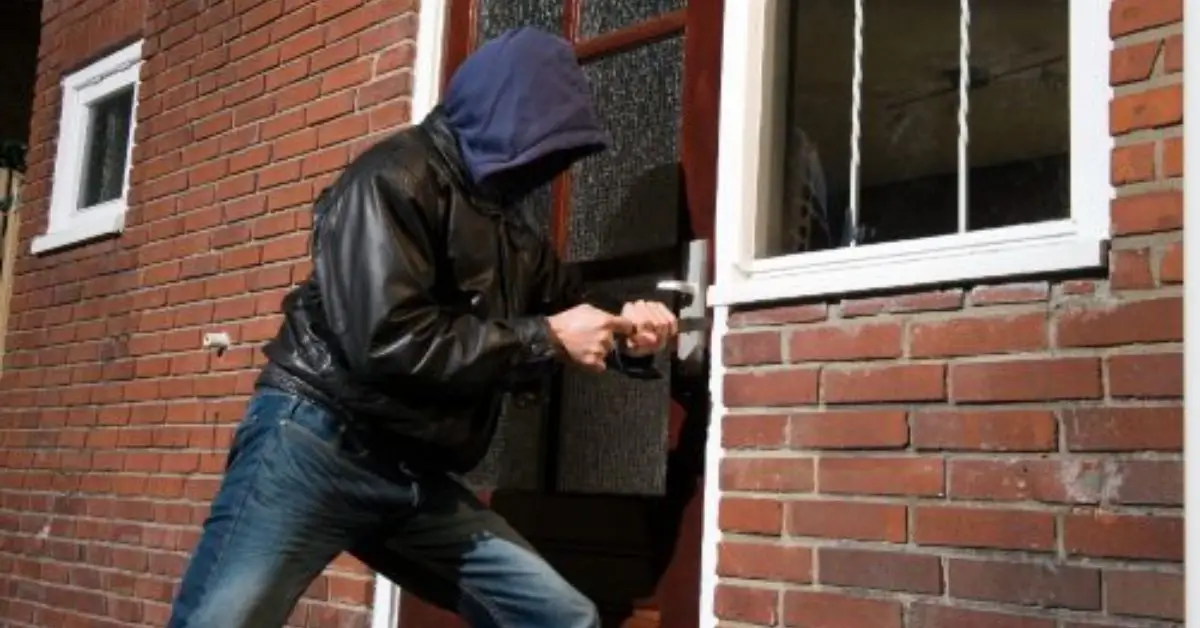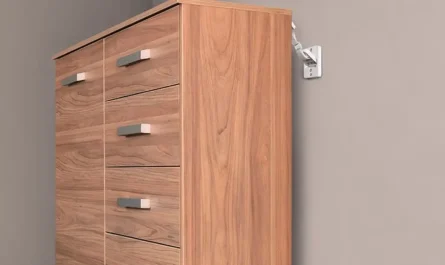10 Things Burglars Don t Want You to Know About Home Security
I used to believe that burglaries were uncommon and only occurred on television or in the news. However, the more I studied actual papers and talks with experts, the more I saw how mistaken I was. Instead of breaking in at random, burglars observe, plot, and search for openings where houses appear to be easy targets. Your home can become vulnerable due to even little mistakes, such as neglecting weak locks or posting vacation photos on social media.
I want to offer ten startling truths about how thieves really work and how they choose their victims in this post. Understanding some of these startling facts can fundamentally alter your perspective on home security. By the conclusion, you’ll have useful advice on how to keep your house safe and the assurance that you’re taking precautions that most others don’t.
1. Burglars Often Enter Through the Front Door
I used to believe that backdoors and windows were the main entry points for robbers. However, many homeowners make the mistake of neglecting the front door, which is actually the most prevalent entrance point.
Things you should know:
-
34% of burglars enter through the front door.
-
Even small things like unlocked locks or a weak door frame make it easy for them. For more detailed insights and the latest statistics on home burglaries, check out these
11 eye-opening home burglary stats every homeowner needs to know
.
-
The Zebra
notes that many homeowners underestimate how vulnerable their front entrances are.
What you are able to do:
- Always lock your doors even if you re just stepping out for a few minutes.
- Reinforce the door frame and use a deadbolt.
- Consider a smart lock or door sensor to get alerts when someone tries to enter.
2. Most Break-Ins Occur During Daylight Hours
I thought that burglaries only occurred at night. It’s easy to think that way, to be honest. However, the truth is that a lot of break-ins happen during the day, usually when homeowners are out running errands or at work or school.
Things you should know:
- Daytime burglaries are surprisingly common.
- Burglars often observe your routines to find the best time to strike.
- Homes that appear empty during the day are more likely to be targeted.
What you are able to do:
- Ask a neighbor to watch your home when you re out.
- Use timers for lights to make your home look occupied.
- Avoid posting on social media that you re away wait until you re back.
3. Burglars Scout Homes Online Before Striking
The fact that criminals look up homes online before ever leaving is something that truly got me to reconsider sharing information online. They can get a blueprint of your house from vacation blogs, virtual tours, or real estate listings.
Things you should know:
-
Former burglars admit that online listings give them
detailed layouts and entry points
. - Even harmless social media posts can reveal when your home is empty.
What you are able to do:
- Limit what you share online about your property.
- Avoid posting travel plans in real time.
- Think of your online profile as part of your home security plan.
4. Beware of Dog Signs Can Be Misleading
It’s a common belief that a Beware of Dog warning deters potential robbers. Although experts claim it might occasionally backfire, I used to rely on it myself.
Things you should know:
-
Burglars may think the sign means
there s no motion detector
, making the home easier to target. -
Relying only on signs gives a
false sense of security
.
What you are able to do:
-
Use
multiple layers of protection
like alarms, cameras, and motion sensors. - Make your home look occupied even when it isn t.
-
Treat the sign as
just one part of your security strategy
, not the whole plan.
5. Uncollected Mail Signals an Empty Home
I had no idea that a mound of mail might turn your house into a target. Burglars are always searching for indications that no one is home.
Things you should know:
-
Uncolle
cted mail or packages are a big red flag.
- Even newspapers left at the doorstep can attract intruders.
What you are able to do:
-
Hold mail delivery
if you re going away. - Ask a trusted neighbor to collect your mail.
- Consider a smart mailbox or delivery locker.
The Guardian offers a fantastic piece if you’re looking for some doable advice on how to keep your house safe while you’re away.
6. Basic Security Measures Are Often Overlooked
We sometimes overcomplicate security, but I’ve discovered that the simplest actions frequently have the most impact. Many homeowners neglect these, which leaves their houses vulnerable.
Things you should know:
- Deadbolts, security cameras, and locked windows are often neglected.
- Burglars look for homes that appear easy to enter don t make yours one of them.
What you are able to do:
-
Install
deadbolts
on all doors. -
Use
security cameras
in visible areas to deter intruders. - Make sure all windows and secondary doors are locked at all times.
7. Vacations Are Prime Times for Break-Ins
Holidays are a prime time for burglaries, I’ve found. Our residences are excellent targets when we’re having a good time abroad.
Things you should know:
- Burglary claims spike during holiday seasons.
- Burglars monitor homes that appear empty for long stretches.
What you are able to do:
- Use timers on lights to make your home look occupied.
- Ask a neighbor to park in your driveway or check in on your property.
-
Avoid announcing your trips on social media until after you re back. Heading out for a trip? Make sure you take these
5 essential steps before going away for the weekend
to keep your home safe while you re gone.
8. Smart Home Devices Can Enhance Security
The game has changed due to technology.Motion sensors and cameras are examples of smart technologies that actively discourage criminals in addition to alerting you.
Things you should know:
- Video doorbells let you see who s at the door in real time.
-
Motion-activated lights can startle intruders before they enter. While smart devices and lights can boost security, it s also important to make sure your electrical setup is safe here s a guide on
5 warning signs your light switch could be a fire hazard and what to do about it
.
- Security systems that connect to your phone allow instant alerts and monitoring.
What you are able to do:
-
Invest in a
video doorbell
or indoor/outdoor security cameras. - Use motion sensors for entry points and dark areas around the home.
- Integrate devices into a smart home app for full control even when away.
9. DIY Security Hacks Can Be Effective
The good news is that you don’t need a large budget to make your house safer, even if security systems might be pricey. In fact, a few easy do-it-yourself methods can discourage intruders.
What you are able to do:
-
Install motion-sensor lights
around entry points they scare off intruders before they get close. -
Secure sliding doors
with a broomstick or rod in the track this small trick makes it harder to force open. -
Use timers for lights
when you re away so your home appears occupied. - These small actions can make a huge difference without breaking the bank.
The Andover Companies provides a fantastic guide that I’ve found to be really helpful for more doable do-it-yourself projects.
10. Burglars Often Know Their Victims
I was astonished to learn that a large number of burglaries are carried out by someone the homeowner knows. Because of this, prudence and trust are just as crucial as locks and cameras.
Things you should know:
-
Burglars often
study their targets
and know routines, schedules, and weaknesses. - Oversharing personal info or trusting the wrong person can make your home vulnerable.
What you are able to do:
-
Be careful about
who you give keys or access
to. - Avoid discussing travel plans or schedules with casual acquaintances.
- Stay vigilant even among people you think are trustworthy sometimes familiarity can be exploited.
Actionable Dos & Don ts for Homeowners
With all the threats out there, I know it might feel daunting to secure your house. For that reason, this section provides you with a concise, useful checklist that you can apply right now.
Dos of Home Security
-
Use strong locks and deadbolts
on all doors and windows. -
Install alarms or smart devices
like cameras and motion sensors. -
Conceal your absence
when you re away timers for lights or asking a neighbor to check in helps.
Don ts of Home Security
-
Don t overshare online
about your home, schedule, or trips. -
Don t ignore weak points
like unsecured gates, basement windows, or sliding doors. -
Don t leave valuables visible
through windows or doors keep them out of sight.
Conclusion
It’s not necessary to feel overwhelmed when taking charge of your home security. In actuality, you are just as intelligent, perceptive, and opportunistic as burglars. You can take preventive measures that truly have an impact if you understand how things work, from scouting online to entering through front doors. Your risk can be significantly decreased by taking easy steps like locking all doors and windows, using smart devices, controlling mail and deliveries, and being careful what you disclose online.
Consistency and awareness are crucial. Developing a culture where safety is ingrained in your everyday activities is more important than merely setting up cameras or alarms. A significantly more secure atmosphere can be achieved with even minor changes, such as setting lights on timers while you’re gone or routinely inspecting your home’s weak spots.
I urge you to evaluate your current security configuration right now. Consider the gaps we’ve covered, the practical dos and don’ts, and what works for your house and way of life. Every action you do safeguards your loved ones and improves your peace of mind.
If these pointers were helpful to you, please leave a comment below with your ideas or experiences.I enjoy listening to how readers apply these tactics. Visit Build Like New for additional comprehensive instructions, useful suggestions, and professional guidance on how to maintain your house safe and secure.
Contents Table
-
1. Burglars Often Enter Through the Front Door
-
2. Most Break-Ins Occur During Daylight Hours
-
3. Burglars Scout Homes Online Before Striking
-
-
4. Beware of Dog Signs Can Be Misleading
-
5. Uncollected Mail Signals an Empty Home
-
6. Basic Security Measures Are Often Overlooked
-
7. Vacations Are Prime Times for Break-Ins
-
8. Smart Home Devices Can Enhance Security
-
9. DIY Security Hacks Can Be Effective
-
10. Burglars Often Know Their Victims
-
Actionable Dos & Don ts for Homeowners
-
Dos of Home Security
-
Don ts of Home Security
-
-
Conclusion
-
3. Burglars Scout Homes Online Before Striking
-
Dos of Home Security
-
Don ts of Home Security




